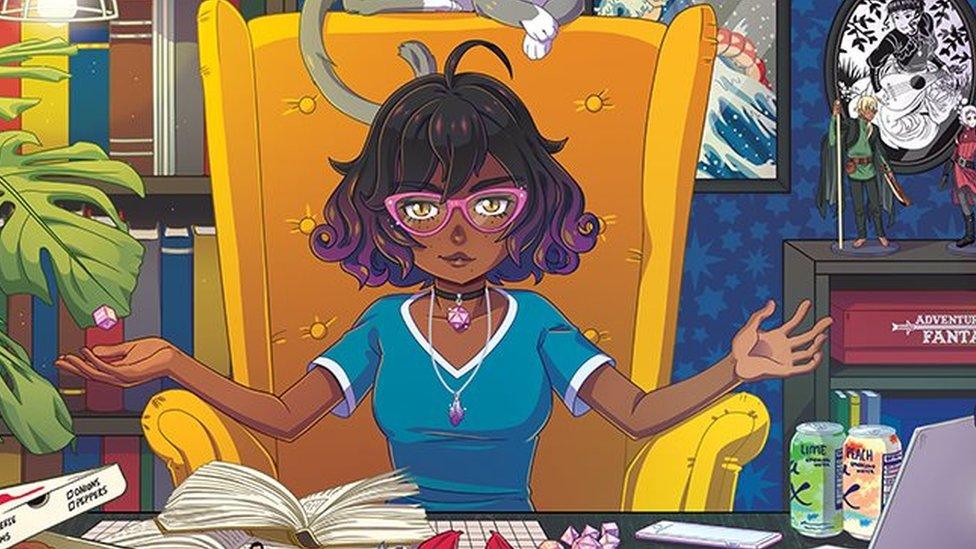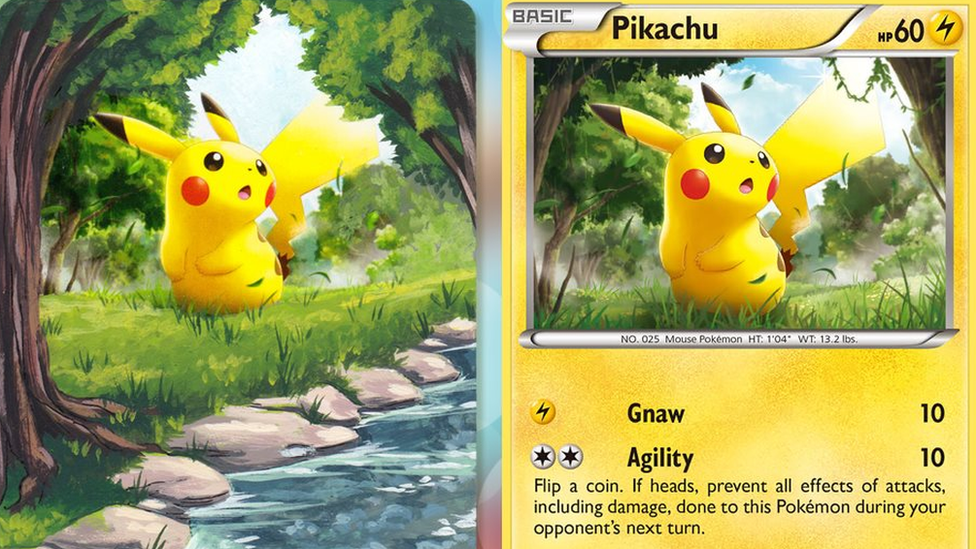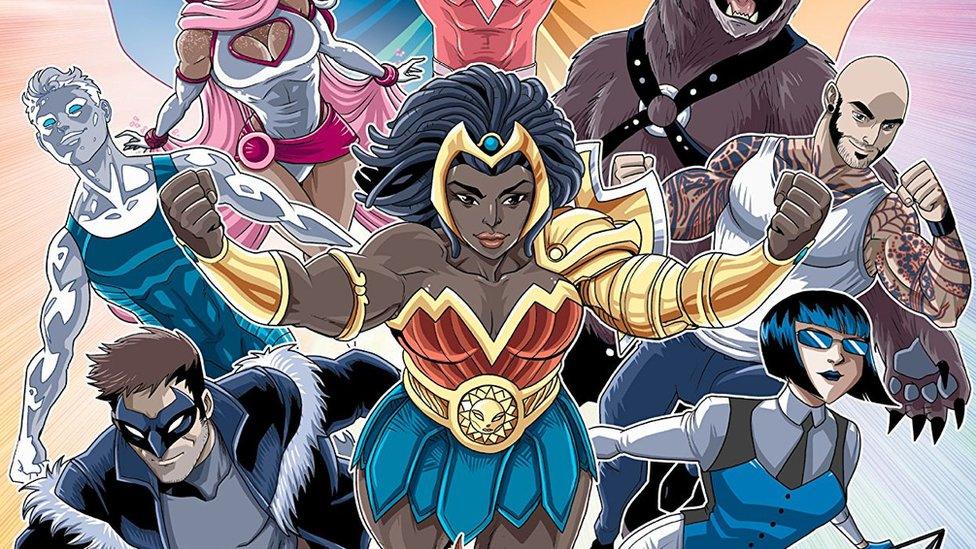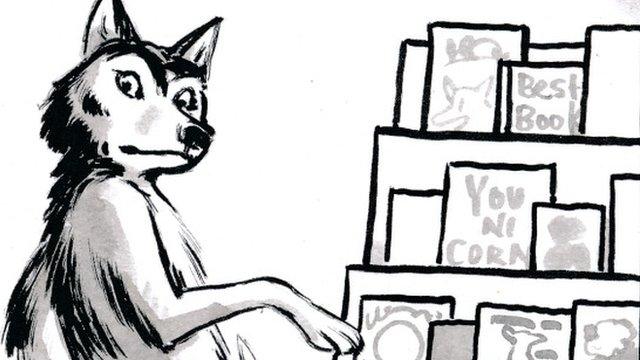How bots are stealing artwork from artists on Twitter
- Published

A popular piece by one of the artists whose art was stolen by automated systems
Artists have told the BBC how their artwork is being stolen from social media and sold for profit online.
They claim malicious individuals are finding their art, often with the aid of an automated system known as a bot, and uploading it on to a website where it can be sold on a T-shirt without the artist's permission.
The individuals then comment underneath the artist's work on social media with a link to the T-shirt website, tricking the artist's fans into thinking it is an official product.
Some artists have claimed this entire process can occur without any human intervention.
They say the bot finds the image, uploads it to a third-party T-shirt-selling website, and posts the link automatically.
This led some artists to try to get their own back on the bots by posting images that clearly state they are infringing copyright.
Allow X content?
This article contains content provided by X. We ask for your permission before anything is loaded, as they may be using cookies and other technologies. You may want to read X’s cookie policy, external and privacy policy, external before accepting. To view this content choose ‘accept and continue’.

There is no indication that the people doing this are in any way associated with the websites where the T-shirts are being sold.
But there is frustration that the websites are not doing more to stop it.
Rob Schamberger, a professional artist who works with pro wrestling company WWE, told the BBC how the automated system works.
"It's something that really needed to be addressed," he said. "I noticed the trend was it always happened whenever someone responded they'd 'love to have this on a shirt'."
Allow X content?
This article contains content provided by X. We ask for your permission before anything is loaded, as they may be using cookies and other technologies. You may want to read X’s cookie policy, external and privacy policy, external before accepting. To view this content choose ‘accept and continue’.

"Someone has programmed something to search Twitter for a phrase (such as, I want this on a T-shirt)," he said. "It takes the image, puts it on to one of these T-shirt-selling websites, then sells the products more or less instantly. It's automated."
He also warned that the websites where these items are sold may not necessarily be above board, and advised his fellow artists what they should do to avoid it happening to them.
"Some of these websites may not be legitimate at all," he said. "They could just be taking people's money.
"This is a kind of more insidious and nefarious thing. So if you respond to my artwork saying you want a shirt of this, to protect my work, I have to block you."
Allow X content?
This article contains content provided by X. We ask for your permission before anything is loaded, as they may be using cookies and other technologies. You may want to read X’s cookie policy, external and privacy policy, external before accepting. To view this content choose ‘accept and continue’.

Rob is not alone. The BBC spoke to several artists who said they had had their art stolen in this way.
"It happens every few months or weeks," said Missy Pena, a freelance illustrator based in Washington. "I don't go looking for it anymore, but people who know my work will reach out to me when they find another site selling my fan art on shirts.
"I usually have to hunt down a contact to send a DMCA takedown notice to. I keep one as a form letter and just change the links to the stolen artwork in it.
"This usually works if the site stealing my work is American, but if they're located in China it's a gamble.
"They may remove the work, but typically they ignore me. Lately they've begun to block my emails, which means there is nothing I can do."
She was one of the many to post on social media an image taking aim at the bots.
Allow X content?
This article contains content provided by X. We ask for your permission before anything is loaded, as they may be using cookies and other technologies. You may want to read X’s cookie policy, external and privacy policy, external before accepting. To view this content choose ‘accept and continue’.

And while some of these Twitter accounts have been removed from the platform, others are still functioning.
Luciana is a 21-year-old artist from London. She explained that this type of theft has happened to her, with others simply taking images from her official T-shirt website and uploading them for sale elsewhere.
"In my spare time I like to upload silly shirt designs on T-shirt websites," she said. "I saw someone had tried to link someone asking to buy a shirt to a different website.
"They'd tried to say, 'This is where you can buy the shirt', so I checked the website. There was not very much information on who designed it or where the money was going.
Allow X content?
This article contains content provided by X. We ask for your permission before anything is loaded, as they may be using cookies and other technologies. You may want to read X’s cookie policy, external and privacy policy, external before accepting. To view this content choose ‘accept and continue’.

"All their responses and tweets were the same thing," she said, referring to the account which she says took her art. "Responding to people commenting or saying they wanted a shirt design, with the same image recreated on a shirt, all going to these websites.
"I wanted to spread awareness to other artists as they're getting their art stolen too. I didn't want other people who were talented to lose money from this exact thing happening."
T-shirts which Luciana says use her artwork without her permission can still be found for sale on multiple websites online.
The Twitter account which Luciana says took her artwork is still active.
The BBC has contacted the T-shirt selling websites for comment.
- Published7 April 2019

- Published29 November 2019

- Published22 March 2019
